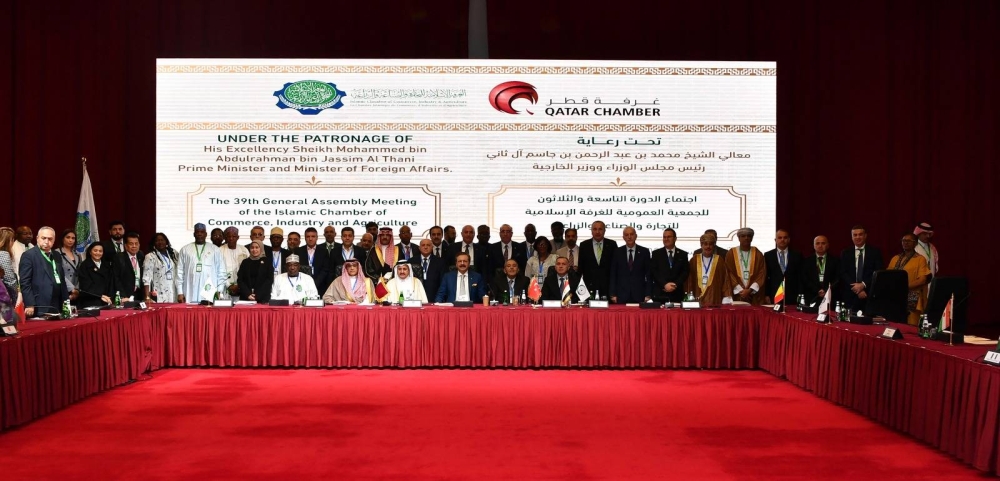Officials and representatives of 28 Islamic chambers worldwide convened in Doha for the recently concluded 39th Meeting of the General Assembly of the Islamic Chamber of Commerce, Industry, and Agriculture (ICCIA) hosted by Qatar Chamber.
The meeting, which was held under the patronage of HE the Prime Minister and Minister of Foreign Affairs Sheikh Mohamed bin Abdulrahman bin Jassim al-Thani, discussed a variety of topics, including ways to empower the private sector.
In a speech, ICCIA president Abdullah Saleh Kamel said: “I call on the board of directors of all affiliated institutions to align with the chamber’s strategy aimed at empowering the private sector and work in a real partnership with the chamber as a founding entity, a genuine incubator, and a continuous supporter of these affiliated entities. As a private sector, we need an integrated system of services provided by all of these institutions, which are essential pillars for the success of our businesses.”
Qatar Chamber chairman Sheikh Khalifa bin Jassim al-Thani, who is also ICCIA first vice-president, lauded the ICCIA for promoting joint Islamic action and harnessing the available potential to enhance trade exchange rates among Islamic countries, as well as achieve sustainable growth in various economic sectors.
Sheikh Khalifa affirmed Qatar’s readiness to support the efforts aimed at enhancing co-operation among Islamic countries to achieve the desired economic integration.
He noted that despite the historical ties and close relations among Islamic nations, intra-trade remains modest and doesn’t reflect the vast potential and tremendous natural resources they possess. He indicated that it doesn’t exceed 15% of the total trade of Islamic countries with the rest of the world.
Sheikh Khalifa further emphasised the importance of streamlining procedures for the exchange of goods and services to boost intra-Islamic trade levels to reach the common Islamic market.
He also underscored the significance of promoting mutual meetings between representatives of the private sector and investors in member states, as well as organising exhibitions to showcase Islamic products, opportunities, and investment incentives available in these countries.
Rifat Hisarciklioglo, ICCIA vice president and president of the Union of Chambers and Commodity Exchanges of Turkiye, also lauded the ICCIA for promoting business growth and improving economic conditions across the Islamic world.
Naghi Jabbarov, director general of the Department of Economic Affairs at the Organisation of Islamic Co-operation (OIC), delivered a speech on behalf of the OIC secretary general, stressing the ICCIA’s crucial role in mobilising the private sector and promoting the economic development of OIC member states.
He announced the launch of the OIC Labour Centre, a specialised institution of OIC, to serve as an executing agency for implementing OIC resolutions and programmes in the domain of labour, employment, and social protection.
The 39th General Assembly Meeting adopted the new name for the Chamber – Islamic Chamber of Commerce and Development – as recommended by ICCIA’s 35th board of directors meeting held on July 17, 2023, in Baku, Azerbaijan.
It also approved the application for membership presented by the Federation of Islamic Associations in New Zealand (FIANZ) as an affiliated member of ICCIA, bringing the total number of member institutions in the chamber to 67 members.
The meeting witnessed the election of the board of directors of the Islamic Chamber Research and Information Center (ICRIC). Furthermore, it reviewed the key achievements accomplished by the ICCIA general secretariat during this year.
On the sidelines of the meeting, Qatar Chamber signed memoranda of understanding with chambers of commerce of Uganda, Djibouti, Azerbaijan, and Turkish Republic of Northern Cyprus.
During the meeting, the ICCIA launched the ‘Empowering Palestine’s Economy Initiative’ to support Palestinians and enable them to face the catastrophic consequences befallen the country due to the occupation.
The initiative aims to enhance the digital empowerment of its workforce and establish a comprehensive system for distance education, connecting academic learning with professional applications, with a focus on the transition towards remote work.
Additionally, it aims to support businesses by launching comprehensive financial initiatives and developing the infrastructure to support remote work, contributing to empowering Palestinians to participate in the global market and build a resilient economy.
The initiative’s scope includes the ‘Remote Jobs Upskilling Platform’, which includes a remote jobs list and integrated learning modules for those interested in remote work, as well as an e-learning hub that offers training courses and specialised workshops for soft skills enhancement and mastering remote work skills, thereby reducing unemployment rates, providing steady income, and enabling the community to achieve financial independence and overcome various economic obstacles.
ICCIA is inviting individuals, businessmen, federations of chambers of commerce, private sector institutions, and international organisations to unite and collaborate in achieving the objectives of the initiative, empowering Palestinians, and supporting economic growth for a better future for the entire Islamic nation.
The Empowering Palestine’s Economy Initiative serves as a roadmap for achieving long-term economic stability based on the relentless efforts of ICCIA to promote economic development, foster growth, and uplift various parts of the Islamic world. As the sole representative of the private sector in Islamic countries, ICCIA reaffirms its commitment to co-operate with relevant institutions to lay the foundations of a bright economic future worldwide.

Officials of member chambers during the 39th Meeting of the General Assembly of the Islamic Chamber of Commerce, Industry, and Agriculture (ICCIA) hosted recently by Qatar Chamber in Doha.
